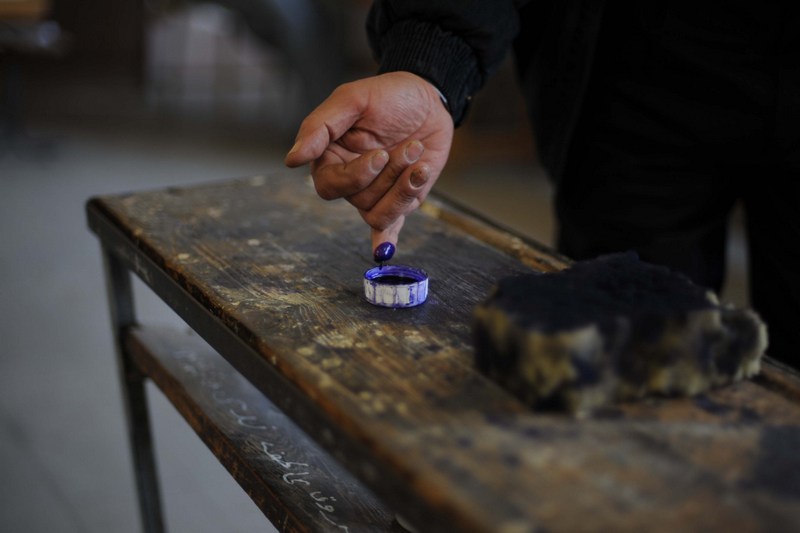
(Photo by Elizabeth Stuart)
Pick an animal.
Mustapha Berjaoui knows what you’re thinking.
A self described “mind illusionist”, Berjaoui, 21, this week became the first Egyptian magician to earn a Merlin, an award Tony Hassini, chairman of the International Magicians Society, describes as the “Oscar of magic”.
The majority of past honourees, which include legendary showmen David Copperfield and Siegfried & Roy, have hailed from the United States or Europe. After coming under fire in 2009 for favouring big-budget acts over magicians in small countries with fewer resources, Hassini said the International Magicians Society began evaluating magicians regionally to ensure more diversity. Berjaoui, who earned the designation “Best Illusionist”, was up against performers in 12 other countries in Africa and the Middle East.
“When you have a lot of money, you can afford to buy bigger props; you can do mind blowing things like make a car appear and disappear on stage,” said Hassini, who flew to Cairo from New York to present Berjaoui his Merlin. “But you don’t need all of those bells and whistles to be a great magician.”
Berjaoui’s act is notably devoid of flash. It took him just 10 minutes to set up at El-Sawy Culturewheel, where he performed Wednesday prior to his award ceremony. A wiry man with a long face and unruly long hair he pulls back in a ponytail, he carried his props on stage in a plain black suitcase, and executed his tricks using just a table, two chairs, a deck of cards and a set of staple guns.
The self-taught magician had the crowd in stitches, however, as he forced a volunteer to put a staple gun to his neck in a version of Russian Roulette. At one point, he threw a wadded up drawing into the crowd before asking a volunteer to name their favourite animal.
“An elephant,” the woman offered.
In the audience, the man who Berjaoui had just beaned in the head, uncurled the paper. It was a drawing of an elephant.
Hassini said the International Magicians Society was impressed with the easy, laidback way Berjaoui engages his audience.
“I’ve seen thousands of magicians,” Hassini said. “Mostapha is original.”
Berjaoui had little choice but to develop his own style, which he describes as a mix between illusion and psychology.
Because belief in witchcraft, sorcery, and demons is common in Egypt, society hasn’t quite made peace with the art of illusion, he said. Under Egyptian law, people claiming to be magicians or sorcerers can be arrested for fraud. Book stores don’t carry a big selection of how-to manuals and some performing venues ban magicians, fearing black magic.

“Magic is haram,” Berjaoui said. “The Arabic word for magic denotes voodoo and spiritual freaky stuff. When you say you’re a magician, people think you worship the devil.”
Like many in his Cairo neighbourhood, Berjaoui didn’t have internet growing up. So, after falling in love with magic after a birthday party performer pulled a coin out of his four-year-old ear, he cajoled his uncle into ordering him a few books from abroad. When a trickster did perform in his neighbourhood, he was there before the show started, sneaking around, peeking through curtains, trying to decipher the performer’s secrets by watching him set up.
“Magicians don’t like to tell their secrets,” he said. “If you tell people how to do a trick, it’s not magic.”
The first trick he learned was how to produce a dove from a hat. He quickly moved on to edgier things like swallowing a threaded needle, which he then pulled from his abdomen (That trick, he said, wowed crowds but left him with an infection).
He got his start performing on the street. At first, he said, people were wary of him. But, unlike many magicians, he doesn’t maintain any pretence about what he does – mostly for safety reasons. “I don’t claim to have any supernatural skills,” Berjaoui said.
Eventually, people began to recognise him. When he would go to the grocery store, they’d stop him to ask for a trick. Once, he gathered a crowd so large that the police intervened.
“If you don’t show us a trick, we are going to take you to jail,” they told him.
Berjaoui was happy to comply.
Now Berjaoui fills theaters – in Egypt and abroad. Still, he has a hard time wrapping his mind around the shiny new trophy on his shelf.
“I can’t sleep,” he said. “I’m thinking about it all the time.”


